Being read across Australia and beyond, the piece by Greg Ray is an unsettling account of a sailor's voyage across the Pacific.
Yachtsman Ivan Macfadyen had done it before, 10 years ago, but this time it was different.
''The birds were missing because the fish were missing. No fish. No birds. Hardly a sign of life at all.''
His boat, the Funnel Web, ''sped across the surface of a haunted ocean'' where a decade earlier, fish and birds had been plentiful.
The next leg of the long voyage was from Osaka to San Francisco and for most of that trip the desolation was tinged with nauseous horror and a degree of fear.
''After we left Japan, it felt as if the ocean itself was dead,'' Macfadyen told Ray.
"We hardly saw any living things. We saw one whale, sort of rolling helplessly on the surface with what looked like a big tumor on its head. It was pretty sickening.
''I've done a lot of miles on the ocean in my life and I'm used to seeing turtles, dolphins, sharks and big flurries of feeding birds. But this time, for 3000 nautical miles there was nothing alive to be seen.''
In place of the missing life was garbage in astounding volumes, Ray writes.
Ivan's brother, Glenn, who boarded at Hawaii for the run into the United States, marvelled at the ''thousands on thousands'' of yellow plastic buoys.
The huge tangles of synthetic rope, fishing lines and nets. Pieces of polystyrene foam by the million. And slicks of oil and petrol, everywhere.
''We were weaving around these pieces of debris. It was like sailing through a garbage tip.''
Back in Newcastle, Ivan Macfadyen is still coming to terms with the shock and horror of the voyage. ''The ocean is broken,'' he said, shaking his head in stunned disbelief.
When associated with an article printed in this week's South China Morning Post magazine, the message of ''a broken ocean'' comes frighteningly close to Phuket.
Kit Gillet writes that Thailand is the world's third-largest exporter of fish and fishery products, with exports valued at about US$7 billion in 2010.
Between 2002 and 2011 exports almost doubled.
But he writes ''it appears the nation's waters are reaching a critical time, with some species nearing the point of no return.''
Across the Andaman Sea and the Gulf of Thailand, Boris Worm, a marine research ecologist and associate professor at Canada's Dalhousie University says: ''There has been enormous decline in the area since the 1960s, with entire species wiped out.''
In the port of Nivat, outside Phuket, several dozen commercial fishing trawlers are moored up tightly along the docks.
Sirasa Kantaratanakul, oceans campaigner for Greenpeace in Thailand, tells Gillet: ''You get fined 5000 baht for fishing within three kilometres of the coast, but this is like a grain of sand for the larger fishers.
''They might as well just pay up before they head out for the night.''
In 1979, Thailand said it would allow no new trawlers, Khun Sirasa tells Gillet, but boat owners simply put many boats under one registration or switch the registration to newer, bigger boats and the government does nothing.
''And then, every 10 years or so, the government has a general amnesty - it's the fourth already; 2107 vessels have been given amnesty this time.
''Last time it was about 4000 vessels. Would you obey a law if, one day, you knew you would be pardoned anyway?''
A few hundred kilometres up the coast from Phuket, the people in Pahklongkleaw village live basic lives and have few material possessions beyond their small family boats.
But the fish are not there to catch any more.
One fisherman says: ''Look at the mesh of our nets and theirs and you can see how we are different to these fishers.
''Nothing can get through their net; they take everything out of the water,'' he says, holding a piece of net that, when pulled tight, is almost a solid sheet of material.
Back in Phuket, after another luckless night at sea, a trawler with a crew of 20 returns with just 500 kilos of anchovies.
''I've been fishing since I was 10, first on my father's boat and then my own - but I might be the last generation if the catches keep going like this,'' says the captain.

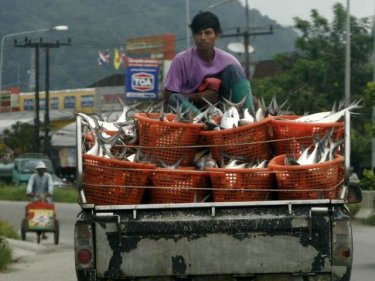













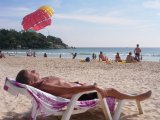
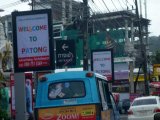
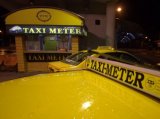
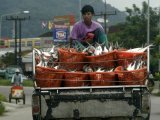



"and the government does nothing."
Says it all....
Posted by nicky on October 22, 2013 16:19